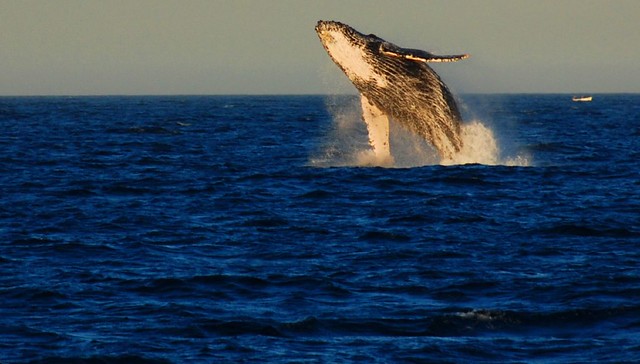Words for whale, sea monster, wolf and other creatures in Celtic languages.
Some species of whales that may be found around the Celtic lands include the humpback whale (Megaptera novaeangliae), the North Atlantic right whale (Eubalaena glacialis), the common minke whale (Balaenoptera acutorostrata), the sei whale (Balaenoptera borealis), the fin whale (Balaenoptera physalus), and the killer whale or orca (Orcinus orca). Other species are available.
Words marked with a * are reconstructions.
| Old Irish (Goídelc) | míl mór = whale, sea monster |
|---|---|
| Middle Irish (Gaoidhealg) | míl mór = whale |
| Irish (Gaeilge) | míol mór = whale míol mór an oighir = humpback whale míol mór dronnach = North Atlantic right whale |
| Scottish Gaelic (Gàidhlig) | mial-mhór = whale mial-mhór a’ chuain = sea-serpent/monster |
| Manx (Gaelg) | meeyl mooar = whale |
Etymology: from Proto-Celtic *mīlom (animal) and *mori (sea) [source].
| Middle Irish (Gaoidhealg) | muirmhil, muirmil = sea animal, fish |
|---|---|
| Middle Welsh (Kymraec) | moruyl, moruill, morfil, morvil = whale, sea monster |
| Welsh (Cymraeg) | morfil [ˈmɔrvɪl] = whale, sea monster, the constellation Cetus (the Whale) morfilaidd, morfilog = whale-like, cetacean morfilydd = whaler, whaling ship morfil cefngrwm = humpback whale morfil cywir / morfil walbon = right whale morfil pigfain = common minke whale morfil (asgellog) sei = sei whale morfil asgellog llwyd = fin whale morfil danheddog / morfil ffyrnig = killer whale |
| Old Cornish | moruil = whale |
| Middle Cornish (Cernewec) | morvil = whale |
| Cornish (Kernewek) | morvil = whale |
| Old Breton (Brethonoc) | mormil = whale |
| Middle Breton (Brezonec) | mormil = whale |
| Breton (Brezhoneg) | morvil [ˈmor.vil] = whale morvileta = to whale, hunt whales |
Etymology: from Proto-Celtic *mori (sea) and *mīlom (animal) [source].
| Proto-Celtic | *bledyos = wolf, large predator (?) |
|---|---|
| Old Irish (Goídelc) | bled, bleith = whale, sea monster bledech, bledach, bladach = abounding in monsters, beasts, whales; monstrous, huge bledmíl = whale, sea monster |
| Middle Irish (Gaoidhealg) | bled = whale, sea monster bledech = abounding in monsters, beasts, whales; monstrous, huge; whale-haunted bledmil = whale, sea monster |
| Irish (Gaeilge) | bleidhmhíol = monster, whale |
| Scottish Gaelic (Gàidhlig) | bleidh-mhial [ble viəlˠ] = sea monster (esp. whale – archaic) |
| Proto-Brythonic | *blėð = wolf |
| Middle Welsh (Kymraec) | bleit, bleyd, bleid = wolf bleidgi, bleiddgi = wolfhound, wolf-dog bleituar = ferocity of a wolf bleidyat, bleityad, bleidiat = wolf-like person, fierce fighter or defender bleidian = (young) wolf, wolf cub |
| Welsh (Cymraeg) | blaidd [blai̯ð] = wolf, hyena blaidd y dŵr = pike (fish) blaidd y môr = wolf fish bleiddaidd = lupine, wolfish, wolf-like bleidd(i)an = (young) wolf, wolf cub bleiddfil = wolverine bleiddgi = wolfhound, wolf-dog, husky bleidd-ddyn = werewolf, wolf-like person |
| Old Cornish | bleit = wolf |
| Middle Cornish (Cernewec) | bleidh, bleit = wolf |
| Cornish (Kernewek) | bleydh [blɛɪð / bləɪð] = wolf bleydh-brogh = hyena ki bleydh = German shepherd dog |
| Old Breton | bleid = wolf |
| Middle Breton (Brezonec) | bleiz = wolf |
| Breton (Brezhoneg) | bleiz [ˈblɛj(s)] = wolf bleiz-broc’h [blɛj(z)ˈbroːx] = hyena bleiz-garv [blɛj(z)ˈɡarw] = werewolf, lycanthrope bleizlouarn [blɛjzˈluːarn] = jackal bleiz-mor = grey seal, fruit bat ki bleiz [kiˈblɛj(s)] = wolf-dog |
Etymology: unknown – probably borrowed from a non-Indo-European substrate language [source].
| Proto-Celtic | *waylos = wolf |
|---|---|
| Old Irish (Goídelc) | fáel = wolf fáelchu = wolf |
| Middle Irish (Gaoidhealg) | fáel, fael, faol [faːi̯l] = wolf fáelaire = wolfhunter (?) fáelchú, faolchú = wolf fáelda = wolfish |
| Irish (Gaeilge) | faol [fˠeːlˠ / fˠiːlˠ] = wolf faolchonda = wolfish faolchondach = wolfishness faolchú = wild dog, wolf |
| Scottish Gaelic (Gàidhlig) | faol [fɯːlˠ] = wolf, wild dog faol-damhan = wold spider faol-duine = werewolf faolach = wolfish |
| Manx (Gaelg) | filliu = wolf filliu thallooin = aardwolf |
Etymology: from the Proto-Indo-European *waylos (wolf, howler) – this was apparently used instead of the usual PIE word for wolf, *wĺ̥kʷos, due to taboos [source].
Sources: Wiktionary, Am Faclair Beag, Online Manx Dictionary, Teanglann.ie, eDIL – Electronic Dictionary of the Irish Language, In Dúil Bélrai English – Old Irish glossary, An Etymological Dictionary of the Gaelic Language, Geiriadur Prifysgol Cymru, Gerlyver Kernewek, Dictionaire Favereau, TermOfis, English – ProtoCeltic WordList (PDF), Etymological Dictionary Of Proto Celtic


